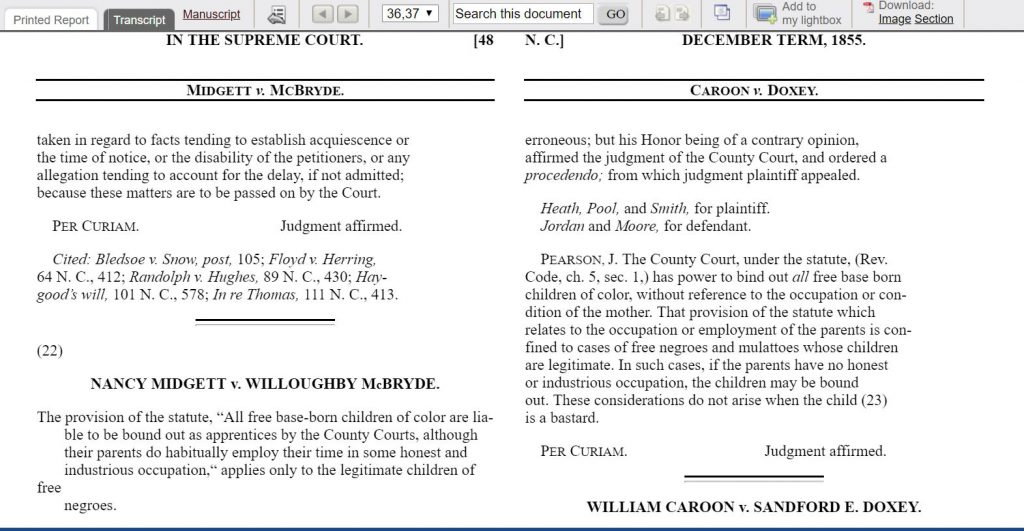After multiple class sessions introducing our archival and manuscript collections and oral history best practices, students in Dr. Nneka Dennie’s Spring 2019 AFR 329: Women & Slavery in the Black Atlantic course produced a documentary using oral histories created throughout the semester. These materials will be donated to the Archives.
In addition to this main project, students were tasked with identifying primary sources from local archives, historic sites, and/or repositories that shed light on the lived experiences of enslaved women or women enslavers. The following series of blog posts are authored by these students upon the completion of this archival research process and serve as reflective pieces.
Thank you for your submissions-and a wonderful semester of fruitful collaborations!
“Nancy Midgett v. Willoughby McBryde”
written by Salome Araya
In December 1855, Nancy Midgett, a white woman living in North Carolina, filed a case in the Supreme Court against William McBryde. Midgett appealed to the courts for full custody of her two children who were described as being “mulatto”, and “begotten by a negro father”. During this time, the law stated that only “legitimate children of free negroes” must serve an apprenticeship alongside their parents. However, the case with Midgett could not apply this law to the case because she was a white woman, who was claiming black children. This case exemplifies what motherhood and family structures served to the system of slavery during the late 1800s in North Carolina.

Agency in motherhood among white women differed tremendously compared to black women in slave societies. However, the barriers produced by a patriarchal system informed what mother’s roles looked like. According to Sarah Franklin, the patriarchy “illuminates the subordination of slave to slaveholder and the similarity of that subordination to the subordination of woman to man and child to adult” (2012, 2). Midgett appeals to the patriarchy, being an active participant in the institution of slavery. In this document, you will notice how Midgett used the reputation of her father to claim custody.
She “illuminated subordination” to her father to prove that she was still following the codes of slavery. This is significant because she did not use the law to try to argue that her children were “worthy” or “deserving” of freedom, despite that their mother was white. Whether or not she would continue to enslave her children is unclear, but it implies what Midgett could give as a mother. Being a mother to “mulatto” or light-skinned children, Midgett internalized slavery’s racism with the racialization of labor. Her children could not be trained to pass down the generational wealth of her family, thus they would have to continue to live as “apprentices” in her household.
Though this document emphasizes the differences in motherhood among white and black women, it also causes readers to question what motherhood looked like for Midgett after she won her case. How did she raise her children in her household? Who raised her children? Lastly, did her case appeal to white enslavers because she saw it as the only way to win? All of these questions reflect how understanding the history of primary sources does not occur in one instance. Using other court appeals and scholarly articles on motherhood and the roles of women in slavery can provide more context to Midgett’s story.
Bibliography:
Franklin, Sarah L. “Introduction: Patriarchy, Paternalism, and the Development of the Slave Society.” In Women and Slavery in Nineteenth-Century Colonial Cuba, 54:1–20. Boydell and Brewer, 2012. https://www.jstor.org/stable/10.7722/j.ctt1x71ph.5.
North Carolina Supreme Court. “Transcripts – Slavery, Abolition and Social Justice.” Accessed April 19, 2019. http://www.slavery.amdigital.co.uk/Contents/Transcript.aspx?imageid=252707&searchmode=true&hit=first&pi=1&previous=0&prevpos=197658&vpath=searchresults&doc=197658.

Speak Your Mind